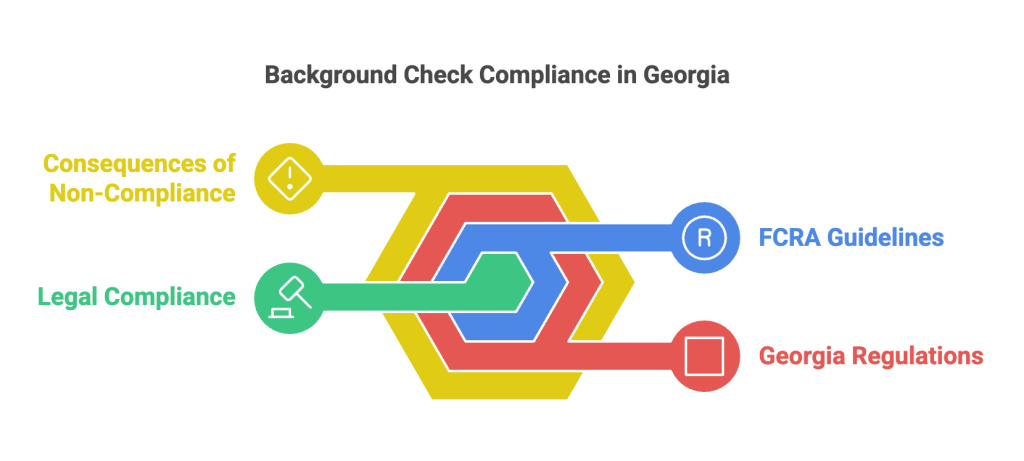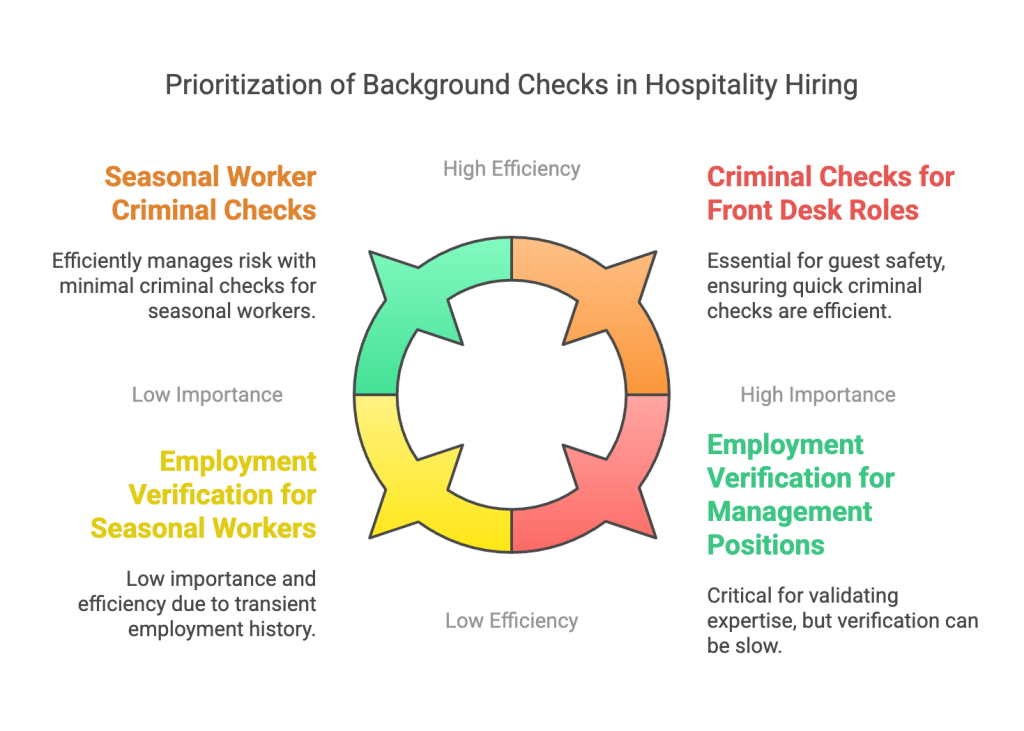In Georgia's bustling hospitality and tourism industry, background checks are a crucial part of the hiring process. This sector is characterized by high turnover, seasonal fluctuations, and the paramount need to ensure guest safety. As such, employers must navigate the complexities of hospitality background checks in Georgia to make informed hiring decisions. This article provides a comprehensive overview, addressing legal, social, and technological dimensions while offering evidence-based insights and actionable advice.
Key Takeaways
- Background checks are essential in the hospitality and tourism industry in Georgia to ensure safety and uphold the businessâs reputation.
- Following legal requirements like the Fair Credit Reporting Act helps avoid costly penalties and maintain trust with employees and candidates.
- Technology speeds up and improves the accuracy of background checks, but securing candidate information remains vital.
- Balancing guest safety with offering opportunities to rehabilitated individuals allows for a more inclusive workforce.
- Clear communication about background check processes with job seekers builds trust and eases concerns, ensuring a smoother hiring experience.
Importance of Background Checks
Background checks serve as a critical filter in the hospitality and tourism sector, particularly in Georgia. This industry is a major economic contributor, drawing millions of visitors annually. Ensuring a safe and secure environment is crucial.
Consider the high turnover rates often seen in hospitality roles. New hires frequently interact with guests, sometimes in their personal spaces. This makes it imperative to verify the backgrounds of employees to safeguard guests and maintain the establishment's reputation.
Criminal history checks are especially significant. Imagine a front-desk staff incident involving theft or assault. Such a situation not only endangers guests but also tarnishes the business's image.
Verifying prior employment history also holds weight. A candidate might claim they have extensive experience in hotel management. But what if they actually spent a short stint in a non-supervisory role? Discovering this before hiring can prevent misplaced expectations and responsibilities.
Think of background checks as your first line of defense against potential risks. Can you afford the consequences of hiring without knowing who your employees truly are?
This article will guide you through the essential elements of conducting these checks. We will explore the legal elements, delve into the types of checks, and discuss best practices. Expect practical tips bolstered by data and perpetual industry developments.
Legal Framework for Background Checks in Georgia
Understanding the legal framework for background checks in Georgia can save you from costly mistakes and ensure you hire the right staff for your hospitality or tourism business.

Let's break it down with key elements:
FCRA Compliance
The Fair Credit Reporting Act (FCRA) sets national standards. It governs how employers in Georgia must handle background checks. You can't go around FCRA requirements without facing legal repercussions.
You must notify candidates in writing if a background check is part of their hiring process. This can't just be mixed in with other documents. It needs to stand alone.
If you decide not to hire someone based on their report, you must share adverse action notices. This lets the candidate know why and gives them a chance to dispute errors in their record.
State-Specific Regulations
Georgia follows federal guidelines but adds its flavor. For instance, while the FCRA covers the basics, Georgia might have specifics about what types of criminal records can be considered after a certain period.
Expunged records are another area to keep an eye on. In Georgia, once a record is expunged, itâs treated like it never existed for most purposes. Bringing these up in a hiring decision could land you in hot water.
Legal Consequences of Non-Compliance
Ignoring these rules can cost you. Legal battles are expensive and time-consuming. The penalties for not following FCRA or state laws can be heavy fines or lawsuits. Going through this not only impacts finances but can also damage your business reputation.
Are you ready to face these penalties? Probably not. Being compliant isn't just adhering to laws; it's also about building trust. If candidates see you following legal standards, they're more likely to view your company positively.
Staying informed and compliant protects both your organization and potential employees. Understanding legal boundaries allows you to conduct thorough and justified background checks, fostering a safe and trusting environment.
Types of Background Checks Commonly Used
To hire effectively in Georgia's hospitality and tourism industry, you need to conduct various background checks. Here are some key types you will encounter:
Criminal Checks for Hospitality Jobs
Criminal background checks are essential in roles where employees interact directly with guests. These checks help ensure safety and security. For instance, if hiring for a front desk position at a busy hotel, knowing whether a candidate has a violent criminal history is critical. This can protect guests and maintain your establishmentâs reputation.
Consider the balance of being thorough yet fair. A minor infraction from a decade ago might not impact a candidateâs ability to perform. Weigh the relevance and timing of any criminal records uncovered.
Employment Verification in Tourism
Verifying past employment confirms that candidates have the experience they claim. For example, if you need a banquet manager, verifying their prior roles can validate their expertise in handling large events. This check can also highlight inconsistencies or gaps in employment history.
You may often face situations where past job verifications lag, especially with seasonal work history. A straightforward approach is to ask candidates for pay stubs or tax records if you hit a dead end with past employers.
Seasonal Worker Background Checks
The hospitality industry often deals with seasonal workers during peak travel seasons. Screening these workers poses unique challenges due to the high volume and quick turnaround. You might find it harder to gather comprehensive background info for a large batch of transient candidates.
When dealing with seasonal hires, prioritize criminal checks and verify at least the most recent employment. The key is efficiency. Use digital platforms that accelerate the process without sacrificing thoroughness. These checks, even at a basic level, can help manage risk in a high-turnover environment.

Navigating various types of background checks neednât be complicated. By focusing on practical checks that directly relate to job demands, you streamline hiring while enhancing security and reliability.
Social Considerations in Hospitality and Tourism Hiring
When hiring in the hospitality and tourism industry, you have a responsibility to prioritize guest safety through thorough background checks. Every new hire is not just an employee but a representative of your brand to guests. Ensuring that staff can be trusted is paramount. This involves screening for any criminal history that could pose a risk to patrons and other employees.
But as an employer, you must also weigh this responsibility against the opportunity to offer employment to those with past convictions who have shown genuine rehabilitation. Many individuals whoâve been through the justice system have worked hard to turn their lives around. Consider their efforts and potential contributions to your team.
A crucial step is to evaluate each situation on a case-by-case basis. Look beyond the conviction and consider the time elapsed, nature of the crime, and any subsequent behavior. Offering a chance to rehabilitated individuals can enhance your team with dedicated workers eager to prove themselves. However, always maintain focus on the safety and integrity of your operation.
How do you balance these factors in your hiring practices? It might involve setting transparent policies that are fair yet rigorous. Consider implementing a comprehensive approach that assesses risks while recognizing rehabilitation and transformation.
In doing so, you're not only fulfilling a social duty but also contributing to a more inclusive job market. This approach can foster a more supportive environment within your industry and community.
Technological Advances in Background Screening
High-tech solutions are changing how background checks are done. Technology is making the process faster and more accurate.
Online platforms now provide quick criminal checks and employment verifications. These systems reduce the time needed to complete checks from weeks to days.
Moreover, digital solutions help improve accuracy. They minimize human error by automatically cross-checking data from various sources.
But remember, data protection is crucial. You must secure candidate information to prevent breaches. Using encryption and regularly updating security protocols are essential practices.
Automation and AI are playing bigger roles as well. Automated systems can screen large volumes of applicants efficiently. AI-powered analytics assist in predicting candidate behavior based on past data.
For instance, AI can identify patterns that might indicate potential red flags. However, you must ensure compliance with privacy laws when using these technologies.
As these advancements grow, consider how they fit into your hiring strategy. Could they speed up your processes or offer better security? Embracing these tools might be crucial for staying competitive in the hospitality and tourism industry.
Best Practices for Conducting Background Checks
Background checks are crucial for maintaining safety in the hospitality industry. Hereâs how to do them effectively.
Safety-Focused Hiring
Ensure that your process is thorough and consistent. Begin with clear policies outlining which checks are required for different roles. For positions involving direct guest contact, focus on criminal history and past employment. Document every step to maintain a reliable record.
For example, when hiring for a front-desk position, emphasize checks for theft or fraud offenses. This practice boosts trust and safety for guests and employees alike.
Transparency with Job Seekers
Honesty goes a long way. Inform candidates early about the checks involved. Explain why theyâre necessary and how the results will impact their application. This openness builds trust and reduces misunderstandings.
Let's say a candidate is worried about a past minor offense. Discussing it openly allows them to provide context and show rehabilitation efforts.
Continuous Screening
Background checks shouldnât end after hiring. Regular screenings help keep standards consistent and reveal any issues that arise later. Consider annual checks for roles involving sensitive information or where safety risks are heightened.
For instance, consider a hotel manager who is regularly updated on employee statuses. This proactive approach reduces risks and upholds company standards.
Adopting these practices ensures a safer and more reliable hiring process, benefiting both your organization and the people it serves.
Challenges and Solutions
High-Turnover Screening in Georgia
The hospitality industry in Georgia faces high turnover rates, which means conducting frequent background checks. This constant churn can be taxing on resources and time.
However, staying consistent with background checks is essential for maintaining a safe environment for guests and employees.
Consider creating a streamlined process. Use standardized procedures and forms to expedite checks. This can help manage the workload without sacrificing thoroughness.
Rely on trustworthy background check providers who can offer fast and dependable services. Building a good relationship with your service provider can result in smoother operations and quick turnarounds.
Investing in efficient platforms can also reduce the time spent on each check while ensuring compliance with legal standards.
Overcoming Resource Constraints
Many businesses operate on tight budgets. Allocating funds for thorough background checks might seem challenging.
Prioritizing critical roles that require stern scrutiny could be one approach. These are jobs with significant guest interaction or access to sensitive information.
Seeking partnerships with companies specializing in background checks can sometimes offer discounts or flexible payment plans, spreading costs over time.
Another strategy is batch processing, where multiple checks are conducted together, potentially reducing costs associated with individual screening.
Keep in mind the ultimate goal: safety and compliance. Cutting corners might save a few dollars now but could lead to greater expenses or liabilities in the future.
How can you balance these constraints while ensuring thorough background screening? Think creatively, partner effectively, and prioritize.
Job Seeker Tips for the Hospitality Industry
When you're applying for a job in hospitality, background checks are part of the package. Here's how you can prepare.
First, be ready to share accurate and honest information. Double-check details on your application, especially dates of employment and job titles. Inconsistencies can raise red flags.
Next, understand your rights. You have a right to know if an employer will run a background check, and to receive a copy of the report if it leads to an adverse decision.
Have past issues? Donât let them define you. Focus on explaining how you've changed and what you've learned. Be prepared to discuss these topics if they come up in an interview.
For those with criminal records, proactive communication is key. You might not have to disclose everything, but it helps if you can show rehabilitation and readiness.
Finally, use background checks as motivation to keep your record clean and professional. This approach not only helps in securing jobs but also fosters growth in your career.
Conclusion
Hospitality is all about connectionsâstart yours on the right foot. Georgia's hospitality and tourism industry values diligent background checks as a cornerstone of safe and compliant operations. Employers must balance guest safety with regulatory requirements and emerging technologies.
Staying aligned with compliance, especially under the Fair Credit Reporting Act (FCRA) and local state laws, ensures legality and fairness. Legal repercussions for non-compliance can be severe, affecting both reputations and operations.
High-tech screening solutions are reshaping the approach to background checks. Automation quickens these processes, allowing for more rapid onboarding without sacrificing accuracy. However, data privacy must remain a priority, ensuring all candidate information remains secure.
Socially, the industry maintains a duty to prioritize guest safety. Yet, they also face the challenge of granting opportunities to all candidates. Past convictions don't inherently equate to present dangers; employers must discern rehabilitation efforts from ongoing risks.
Amidst high turnover, keeping up with the demand for seasonal workers can be challenging. Strategies must accommodate resource limitations without compromising thoroughness.
Transparency with job seekers is fundamental. Clear communication about the process fosters trust and eases candidate concerns. Periodic screenings reinforce a proactive stance on compliance.
For job seekers, understanding rights remains essential. Awareness of legal protections provides a foundation for addressing past issues candidly. Rehabilitation and skills should be highlighted during interviews to demonstrate capability and growth.
In the future, background checks will likely integrate more AI-powered solutions. Staying informed about these shifts will keep both employers and candidates ahead, opening pathways for safer, more efficient hiring.
Frequently Asked Questions (FAQs)
What background checks are required for hotel staff in Georgia?
Background checks for hotel staff in Georgia typically include criminal history checks, employment verification, and reference checks. Some hotels might also conduct drug tests or credit checks depending on the position.
Are seasonal workers in Georgiaâs tourism industry screened differently?
Seasonal workers often undergo similar background checks as regular employees. However, the depth of these checks may vary based on the employer's requirements and the duration of employment.
How can Georgia hospitality employers ensure FCRA compliance?
To comply with the Fair Credit Reporting Act (FCRA), employers must obtain written consent from the applicant before conducting a background check. They should provide a summary of rights and follow proper procedures if they decide not to hire based on the report.
What safety measures depend on background checks in Georgiaâs tourism sector?
Background checks help ensure safety and security for both guests and staff. They identify applicants with potential red flags, such as a history of violence or theft, thus protecting the businessâs reputation and maintaining a secure environment.
Are criminal checks mandatory for tourism jobs in Georgia?
While not legally mandated for all tourism jobs, many employers choose to conduct criminal checks to safeguard their business and customers. Certain positions, especially those involving direct guest interaction or financial responsibilities, are more likely to require such checks.
What challenges do high turnover rates create for Georgia hospitality employers?
High turnover rates can increase recruitment and training costs. It also disrupts team dynamics and may impact service quality. Employers must invest more resources in continuously training new staff and ensuring consistent guest experiences.
How can background checks improve customer trust in the tourism industry?
Conducting thorough background checks demonstrates a commitment to safety and professionalism. This can enhance customer trust, leading to repeat visits and positive reviews.
What types of positions in the hospitality sector require more extensive background checks?
Positions that involve financial transactions, managerial roles, or access to sensitive information typically require more comprehensive background checks to prevent fraud and ensure regulatory compliance.
How prevalent are background checks for Georgiaâs hospitality-hiring process?
Background checks are common in Georgia's hospitality sector. They are considered a standard practice to ensure a safe and secure environment for guests and employees.
What are common red flags found during hospitality background checks?
Frequent job changes without explanations, criminal convictions related to theft or violence, and inconsistencies in employment history are common red flags that may arise during background checks.

GCheck Editorial Team
Meet the GCheck Editorial Team, your trusted source for insightful and up-to-date information in the world of employment background checks. Committed to delivering the latest trends, best practices, and industry insights, our team is dedicated to keeping you informed.
With a passion for ensuring accuracy, compliance, and efficiency in background screening, we are your go-to experts in the field. Stay tuned for our comprehensive articles, guides, and analysis, designed to empower businesses and individuals with the knowledge they need to make informed decisions.
At GCheck, we're here to guide you through the complexities of background checks, every step of the way.





